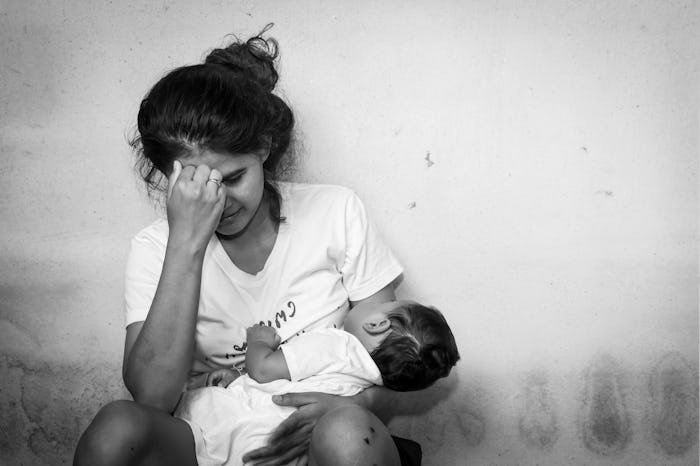Life

Here's What's Really Hurting New Moms: Ourselves
I was bullied my entire childhood. I thought things would be different when I became an adult, but as a mom I've discovered a hard truth: moms are mean to one another. I mean, horribly mean. They're rude behind your back, to your face, in person, online, at the pick-up line at school, and in the formula aisle. While we joke about the so-called "mommy wars," it's impacting moms' self esteems and mental health in a serious, damaging way. It seems that what's really hurting new moms is other moms, and that's not OK.
I've experienced this mom-on-mom hatred firsthand. Since my first child was born, I've been shamed for getting an epidural, mocked for using formula, and teased for breastfeeding in public. I've been treated like a social pariah for being a single mom. I've been body-shamed at the gym. I've been taunted for not understanding the school drop-off rules (they are way too complex to navigate when you are sleep deprived and overwhelmed, you guys). I've been pitied for having to go back to work and letting "day care raise my kids." I've also witnessed moms taunt, bully, and shame other moms about pretty much every parenting choice you can make. It's as messed up as it is hurtful. It's as hurtful as it is exhausting.
And the worst part, of course, is that I know I'm not alone. In a survey conducted by Mom.life, almost 80 percent of the moms said they had experienced bullying, and 67 percent said that their bullies were other moms. It seems like a generation of so-called "mean girls" has grown up and enlisted in the seemingly never-ending "mommy wars." And it's taking a serious toll on new moms.
We are also pretty hard on ourselves. As USA Today reports, nine out of 10 new moms feel pressure to be perfect. Societal pressures and cultural norms surrounding things like childbirth, breastfeeding, working outside of the home, and screen time create preconceived notions around what motherhood is supposed to look like. We subconsciously and overtly bully moms who don't conform to what we perceive to be "normal," while simultaneously holding ourselves to impossible standards. What we don't realize is that moms are human beings, and literally nobody is perfect. There's more than one "right" way to parent, you can only do so much, and your baby needs you to be healthy far more than they need you to be perfect.
We subconsciously and overtly bully moms who don't conform to what we perceive to be 'normal,' while simultaneously holding ourselves to impossible standards.
Unfortunately for new moms, feelings of inadequacy can put you at risk for postpartum mood disorders, like postpartum depression and anxiety. One study published in the Journal of Clinical Nursing showed that new moms who feel like they aren't doing a good job are far more likely to suffer from postpartum depression. And according to the the same study, the key to feeling like a good mom is receiving adequate social support, which can be pretty hard to find when other moms treat you like crap. Another study in Maternal and Child Health showed that moms who plan to breastfeed, but are unable to, are at a higher risk of experiencing postpartum depression. Which makes you wonder: is promoting exclusive breastfeeding is good for new moms? Are people considering the implications when they shame moms in the formula aisle? Probably not, in both cases.
According to Dr. Ruth Ann Harpur, a clinical psychologist and new mom who corresponded with Romper via email, bullying can have a huge impact on a new mom's mental health. It can also result in new moms failing to obtain the help when they need it, which can be a dangerous cycle. Harpur writes:
Bullying can leave a mother believing she is not good enough, that she has failed or is in some way inferior. All mothers face dilemmas and pretty much all of us struggle day to day with something or other. Rather than seeing these struggles as simply part parcel of being human, shame leads a person to feel like they are alone and may result in the mother hiding her difficulties rather than reaching out for the social support or for professional help when it is needed.
Unfortunately, according to Harpur, that shame can actually lead moms to become bullies, too. "Often shame lies at the heart of bullying behavior, as well," Harpur said. "Bullies assert their own need to feel superior by putting others down and to protect themselves from any sense of their own vulnerability and imperfection."
While moms have the capacity to hurt each other, I've also found that we have amazing capacity to heal.
So, where do we go from here? According to Harpur, the solution might be as simple as being kind:
What most mothers need is safe and compassionate support, realizing that all mothers struggle with similar things in one form or other, and ultimately a sense of being 'good enough,' through the roller coaster ups and downs of early motherhood. We would all do well to treat ourselves and each other with kindness, respect, and to bring a gentle sense of humor to the day-to-day life with small people.
I totally agree. We, as moms, have a responsibility to help break this ugly cycle by refusing to participate in the "mommy wars," and by giving ourselves a break, too. We can forget about trying to be perfect all of the time, talk openly about our struggles with motherhood, breastfeeding, and mental health, and build each other up rather than tear each other down. While moms have the capacity to hurt each other, I've also found that we have amazing capacity to heal. In other words, and always: a little kindness can go a long way.